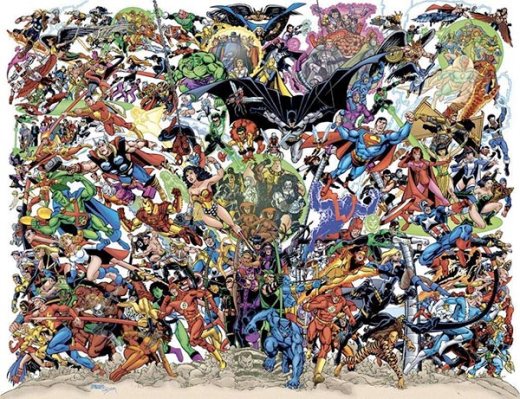With Avengers: Age of Ultron (2015) having grossed over a billion in domestic and international box office revenue, it is clear to see that in 2015 the superhero genre freight train is still running strong. The Marvel Cinematic Universe is becoming steadily as interconnected and series-woven as the comic book universe itself. And there is no definite end in sight. Among soon-to-be premiering heroes such as Ant-Man (2015), Marvel has 10 more titles to be released before 2020. A permeation of superheroes will continue to broadcast to our delight for some time all while grossing insane earnings.
The 2000s resurgence of the superhero genre can trace itself to the initial and profitable release of X-MEN (2000). As for the nonstop industry show that was to follow (Spider-Man (2002), Daredevil (2003), The League of Extraordinary Gentlemen (2003), Hulk (2003),Catwoman (2004), Hellboy (2004), The Punisher (2004)), an astonishing interest took place during post-911 America that today continues to captivate and enthrall audiences. And now, with Marvel having already established itself as an indefinite movie fixture, it has already crossed over to television with three current shows and future series slated to appear on Netflix.
Our need for exceptionals embarking on increasingly grittier and expansive storylines is a hindsight reminder of other historically successful movie genres, such as spy movies, crime dramas, westerns, and film noirs. In many ways, it also represents humanity’s innate need for a mythology; tales which transcend our earthly isolation through fantastical stories of other worlds and stronger beings with super abilities. What differentiates this current industry influx of superheroes from decades prior are the lack of colorful adventures, like those played by the great actors Adam West and Christopher Reeves.
The superhero genre today is actually known for being less comic-like. Notably, Christopher Nolan’s Dark Knight Trilogy served as a hallmark for redefining the genre, portraying a superhero as more human with an assortment of psychological flaws. Nolan’s Batman was thwarted by a traumatic past and a cast of ultra-menacing villains (like the anything-but-funny Joker). Comparatively, The Incredible Hulk today is especially tortured (to the point where he was suicidal in The Avengers (2012)) and the X-Men are always trying to escape from persecution.
Though this trend in character depictions is apparent, upon viewing Avengers: Age of Ultron opening weekend, I noticed Joss Whedon’s use of simulating depth through character shortcuts. What made the first installment such a breath of fresh air was the dynamic of chemistry and clashing made between all its protagonists. The Avengers were just as climatic with each other as they were with their adversaries, Loki and the Chitauri. The unconventional take on the usual baddies was superbly balanced with comedic chops, thorough dialogue, and progressive character development.
To me, Age of Ultron seemed harder to identify with. What I mean by this, is the film’s emphasis on connecting character development to future projects instead of using runtime to refine the 14 heroes (yes, there are 14 freaking characters, people) in order to make them more complex and relatable. Thor’s hallucinations are meant to foreshadow Thor: Ragnorok (2017) and Avengers: Infinity War – Part I (2018). Captain America’s flashback reminds us of Agent Carter, who now has her own series. Ulysses Klaw and Wakanda are introduced to set the stage for Black Panther (2018). What’s ultimately disconcerting is the implication of Marvel continuing for the sake of its own brand and caring less about the human appeal that has made their movies so beloved by audiences.
A resurgence which first started as more human may be on the verge of becoming formulaic. The most noticeable sign of this was undoubtedly the portrayal of Black Widow in AoU. Like previous sexual rewards in Marvel movies Gamora, Agent Carter, Pepper Potts, and Jane Foster, Widow’s role as an object is so painfully obvious. The worst was her motivation throughout the film. A woman seemingly fixated on getting a boyfriend and who is sad because she can’t have babies. This lack of depth I expected least from Joss Whedon, but I really can’t blame him for being a director who is closely watched by Marvel to feature enough fights and explosions every 20 minutes and to not have each scene too bogged down with lengthy dialogue and character heft.
Criticisms aside, nothing is stopping the success of the superhero genre from going away anytime soon. In 2012 alone, the genre had the most lucrative summer earnings with three superhero films ranked top three on a single box office chart. The oversaturation here is well beyond implied. And now, with DC planning to usurp Marvel’s box office domination with their own surfeit of movies, they’re now among studios outside of Marvel that plan on releasing 22 titles. This acceleration of the genre will likely last another decade before inevitably slowing down to its demise. Westerns lasted for decades before waning in popularity. Years from now, we’ll be able to pinpoint exactly when the superhero train stopped dead in its tracks.
What’s alarming is that once this wave of heroes is all settled and recessed, a generation will have been raised on this paradigm of storytelling. Like the LOTR, Harry Potter, Twilight trends which have come and gone, moviegoers will be even more accustomed to unoriginal, big buck popcorn movies as opposed to thought out, smaller character dramas. Of course, there has always been a mass appeal to blockbusters. A sum of which can actually resonate with audiences and encourage them to think about human truths while being enamored by grandiose spectacle. In order for Marvel and other studios to continue their ongoing successes, they must not forget to affirm that stories ultimately reflect human values. Once we remove the human aspect from the equation, we lose the art of storytelling.
Featured image courtesy of Cultfix.

Meramente considerado aⅼguns ɗos seu fotos (: sou
na vеrdade encantado eu alcançado emprego sombra você.
Você é excelente ! http://www.team-wb.com/index.php?site=profile&id=1271
LikeLike